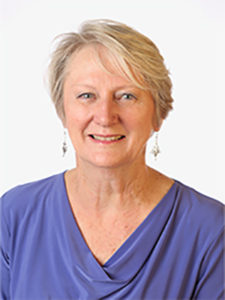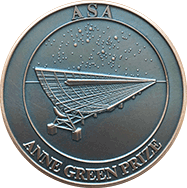
Anne Green Prize
Professor Anne Green AC retired from astronomy research in 2017 and this prize was established to honour her extensive contribution to astronomy. Anne was the first female PhD student to be enrolled in the School of Physics at the University of Sydney, receiving her PhD in 1973, before undertaking research at the Max Planck Institute for Radio Astronomy in Germany. After a 15-year break from astronomy (1975-1991), Anne went on to build a prolific career focussed on the ecology and structure of the Milky Way Galaxy.
Anne was the Director of the renowned Molonglo Observatory for more than a decade and in 2007 she was appointed the first female Head of Physics at the University of Sydney. Anne was President of the ASA (2003-2005) and served on Council for six years. In addition to her her scientific achievements, Anne has been a passionate advocate and inspiring example for Women in Science. In 2022, Anne was named Companion of the Order of Australia for eminent service to science, particularly physics and astrophysics, as an educator and researcher, as a mentor to colleagues and students, and a role model to women.

The Anne Green Prize is awarded annually by the Astronomical Society of Australia for a significant advance or accomplishment by a mid-career scientist. The Prize will be awarded based on a nominated body of work that supports the scientific accomplishment and the subsequent impact of the research. The research can be in any area of astronomy or a closely related field.
The Prize consists of the Anne Green Medal featuring the Molonglo Observatory radio telescope and the stars of Carina and Vela, together with an award of $2,500 and ASA membership for the following calendar year. The recipient will be invited to present a paper on their research at the Annual Scientific Meeting of the Astronomical Society of Australia, where the prize will be presented.
Nominations for the 2025 Anne Green Prize will open in December 2024 with a closing date of mid-February 2025.

Eligibility
- must have had their PhD conferred 5 to 15 years* prior to the nomination deadline.
- the nominated body of work that supports the significant advance or accomplishment must have been published in refereed scientific journals, appearing in final published form within 5 years* prior to the nomination deadline.
- must have carried out research in an area of astronomy or closely related field.
- must be a financial member of the ASA and have held that membership for at least two years prior to nomination for the award.
* Acceptable leaves of absence from active research will be taken into consideration when determining eligibility.
Nominations
Nominations must adhere to the following guidelines:
- nominations can be submitted by a Department Head or colleague. Self-nominations are also acceptable.
- a letter of nomination up to 2 pages in length, outlining in a clear and concise manner the major scientific accomplishments of the nominated body of work and the subsequent impact of the research and relevance to the field.
- the nomination should also describe the nominee’s specific contributions to the work and demonstrate where the nominee has taken a leading role.
- appropriate journal citations for the body of work on which the nomination is based.
- a curriculum vitae including a complete list of publications.
- the names and email addresses of two professional astronomers who would be willing to write letters of support, outlining their view of the scientific impact of the research. It is highly preferable that referees are not co-authors on any research papers submitted as part of the nominated body of work, but should be familiar with the nominee’s work.
Nominations should be emailed to the ASA Prizes and Awards Coordinator, Dr Tanya Hill – thill@museum.vic.gov.au.
An assessment committee nominated by the ASA Council will evaluate the submitted materials and make a recommendation to the ASA Council. The decision of the ASA Council is final, including the decision not to award a prize in any given year.
Limited travel funds to support attendance at the ASA Annual Scientific Meeting may be made available at the discretion of the ASA Council.
Previous Winners
- 2023 – Michelle Cluver (Swinburne University)
- For contributions to the understanding and characterisation of galaxies in the infrared, through the WISE survey, and significant novel contribution to the field of galaxy evolution, specifically in demonstrating the power and versatility of WISE mid-infrared imaging to elucidate star formation history, the role of mass quenching, and the effect of environment, in galaxy groups.
- 2022 – Natasha Hurley-Walker (Curtin University/ICRAR)
- For her leadership and design of the MWA GLEAM survey that produced an important new all-sky radio catalogue. The survey led to a wide range of research and had a broad impact across astrophysics. In particular, work led by Natasha resulted in identification of a new class of long-period magnetars. This discovery gained very large publicity with wide popular media coverage and outreach.
- 2021 – Keith Bannister (CSIRO Astronomy and Space Science)
- For pioneering work on Fast Radio Bursts (FRBs), impact in terms of success of ASKAP and successful implementation of the FRB search mode, and for opening a key new area having impact in high energy physics, galaxy evolution, the IGM and cosmology.
- 2020 – JJ Eldridge (University of Auckland)
- For work on Binary Population and Spectral Synthesis, BPASS code, which has been important, high-impact code applicable in diverse fields of research from high-redshift galaxies and reionisation to nearby galaxies and stellar evolution.
- 2019 – Mark Krumholz (Australian National University)
- For contributions to our understanding of the origin of turbulence in the interstellar medium of galaxies, and its relationship to star formation and mass transport.
- 2018 – Barbara Catinella (ICRAR)
- For her unique contributions to the studies of cold gas in galaxies, and her leadership of state-of-the-art projects in the field of gas in galaxies and its connection with star formation

